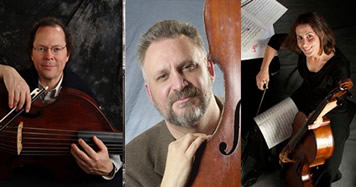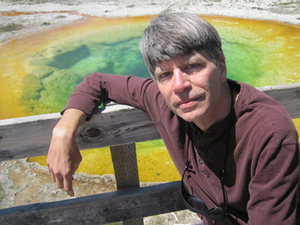Carolina Theater, Durham, October 6, 2005: LongLeaf Opera, the area’s company dedicated to opera in English, kicked off its seventh season with a world premiere, and, for the second time in its short career, an opera based on Shakespeare.
As they did last year for Lee Hoiby’s The Tempest, Artistic Director Randolph Umberger and Music Director Benjamin Keaton assembled a youthful and excellent cast for the world premiere of Joel Feigin’s Twelfth Night in a chamber orchestra version. (A version for full orchestra will be premiered in Moscow in 2006.)
Born in New York in 1951, Feigin is a professor of composition at the University of California, Santa Barbara. He himself prepared the libretto from Shakespeare’s wordy romantic comedy, extracting the essence with a delicate scalpel in order to keep the story and the humor intact. As he explained during a pre-performance conversation, he took as a model Arrigo Boïto, Verdi’s librettist for Otello and Falstaff, who “took everything out, and everything was left.”
While Feigin succeeded admirably, there’s still no getting around the issue of the comprehensibility of sung text. With today’s audiences, Shakespeare is still a quasi-foreign language; before attending a play solid familiarity with at least the plots and subplots is pretty much mandatory. And for a play converted into something else – an opera or ballet – knowledge of the original text is recommended. That being said, the cast did a fairly good job with the diction; we could understand about 60 percent of the text. Umberger’s delightful directing, with wonderful use of sight gags to bolster the Bard’s humor, kept the opera just about as lucid as such concatenations of cross-dressing and mistaken identities can get. Amplification, too, aided comprehension of the libretto but, unfortunately was turned up far too much, especially with singers who already had the vocal power to fill the Carolina Theater without it.
The score is at the same time difficult and accessible. Before the curtain, when we asked Feigin to describe his style, he hedged, promising that it would not be a 12-tone Twelfth Night and noting that some people had compared it to Richard Strauss. All that seemed fair enough, but we too had a difficult time categorizing it. There are moments of tonality, but clouded by use of seventh and ninth chords and lots of passing dissonances; the vocal lines were lyric but not tuneful. We thought we heard some recurring motives, but would have to hear the score more than once to really make sense of it. Fortunately, Feigin was sensitive enough to the text itself not to attempt to compose over it. In that, he appears to have taken a hint from Claudio Monteverdi, one of opera’s pioneers, who insisted that the music must be the servant of the words.
Twelfth Night, naturally, sports the Shakespearean “cast of thousands.” Without the support of fine singing and effective acting, no elegant score nor expert libretto could have saved it. In the star role of Viola/Cesario was soprano Rebecca Myers who combined a beautifully smooth voice with perky acting. Feigin created star billing also for Feste, converting him from just another one of the fools and clowns that populate Shakespeare’s comedies into a kind of major domo, who controls the entire action of the play. Feigin achieved this trick by actually adding a prologue/prelude to the opera in which Feste directs a reenactment of the shipwreck that separates Viola and her look-alike twin brother Sebastian. Baritone Stephen Soich, with a good voice across his range and outstanding acting projected in turn cheek, compassion, guile, mischief and pure fun that made him an audience favorite from the opening moments.
Twelfth Night is one of those plays in which the serious characters simply lose out to the comedians. Soprano Kimberly Benton in the role of Olivia, had difficulty convincing us that she wasn’t playing Queen Victoria. Even when she was pursuing Viola disguised as Cesario, she simply wasn’t convincing. In the otherwise colorful wardrobe of fantastic/Renaissance costumes, hers – which completely obscured her hair – didn’t help. Tenor Daniel Fosha as the lovesick Orsino, looking for all the world like Vasari’s portrait of Lorenzo de’ Medici, managed better. Fosha has a good voice, although his acting was a bit on the wooden side with the more comical parts of his role; but his duet with Viola that ends the first act was splendid. Tenor Timothy Sparks sang the small role of Sebastian. Feigin had to cut some of Sebastian’s lines, especially the mistaken identity love scene with Olivia, making it difficult for Sparks to get a good grip on it. With his usual dramatic and resonant voice, baritone Leonard Rowe sang the role of Antonio, who rescues Sebastian – in the opera, with explicit homoerotic intent, only to lose him to Olivia.
Back to the comics. Talking about having your cake and eating it too, biochemist and baritone Henry Gibbons took on Malvolio, Olivia’s vainglorious steward. Although he started somewhat woodenly, equating a sour personality with stiffness of movement, by the time he donned his yellow stockings with the crossed garters, smiling and strutting in front of Olivia, the audience was in stitches. Likewise with Brad Fugate as Sir Andrew Aguecheek. In the play, Sir Andrew is an androgynous whiner, coward and boozer. In a brilliant stroke, Feigin made him a countertenor. Fugate, a specialist in early music, has a truly wonderful voice, used these days primarily for heroes in Baroque opera. Twelfth Night allowed him to give vent to his silly side, to everyone’s enjoyment. Soprano Louise Toppin, in the role of Maria, Olivia’s maid, has – in addition to a great voice – a twinkle, a smirk and a grin that made us glad Carolina Theater is a small enough hall to easily see facial expressions. Finally, although he lent his name to a species of highly collectable mugs, Olivia’s boozy cousin Sir Toby Belch, landed for the most part on Feigin’s cutting room floor. Baritone Brian Franklin sang the role well but had to give up most of his madcap identity – and his Falstaffian girth – to the ensemble of anti-Malvolio conspirators.
One of the surprises of the evening were the simple but effective sets, designed by Umberger and realized by Toni Constant and the theater students of East Chapel Hill High School. It set off well the extravagant costumes.
The weak part of the production, as usual with LongLeaf productions, was the orchestra. This is not an easy score, and perhaps because of limited rehearsal time the musicians, especially the violins, simply couldn’t keep it together. Fortunately, Keaton kept the dynamics low, so that it did not interfere too much with the voices. A couple behind us was speculating how LongLeaf can attract such good singers from distant parts, such as Soich (Feste), who hails from Colorado. The fact is that after seven years, LongLeaf’s dedication to opera in English has earned it a national profile with the standing to commission new works and attract first-rate singers. Now, someone just needs to donate some big bucks so that they can upgrade their orchestra.
God knows, putting Shakespeare to music is a minefield. Twelfth Night succeeded better than most and deserves its place in the repertory.












